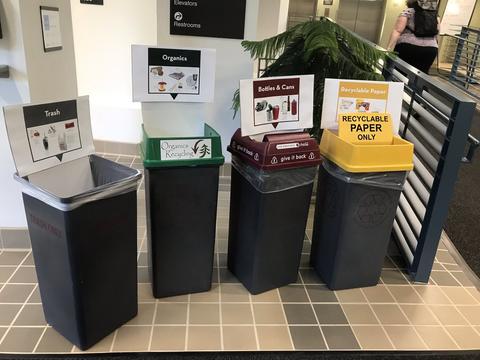

As you may remember from our last blog, we have been talking about organics recycling lately. Last week we discussed the changes that the University of Minnesota has been undergoing recently to make organics recycling more widespread across campus. So how can the members of the campus community get involved?Their goal is to rollout organics collection bins to 180+ buildings on the Twin Cities campus by October 2020. You can read the full story here on our blog!
Continuing this discussion on the importance of organics recycling, we wanted to inform our campus community about all of the ways they can get involved in the movement! After all, the long-term goal is to become a zero waste campus. This means that we would be diverting at least 90% of our waste from incinerators and landfills. The collection of organics is an important and necessary step in reaching that goal.
There are a number of different ways for anybody to participate in organics recycling on campus. The most important way that anyone can get involved is to get informed. This is an easy way that everyone can ensure they are properly sorting their waste and diverting as much from the landfill as possible. When we don’t know where to put our waste, we can contaminate the waste streams. It’s especially important that organics recycling is free of contamination, because we don’t have the opportunity to remove contaminants before this material goes to the composting facility. As a general rule of thumb, when in doubt, throw it out to avoid potentially contaminating a bin. To learn more about what items can be put into the organics bins, visit z.umn.edu/organics.
A more in-depth way of getting involved is to attend the Zero Waste Ambassadors workshop. This opportunity is offered once a semester for individuals excited about the new addition of organics recycling to get in-depth training on organics and waste reduction. Anyone on campus is able to sign up! Each ambassador pledges to dedicate 10 hours to waste reduction on campus. This can be through a number of different ways:
-
Educating others about waste and organics at an event;
-
Educating colleagues about recycling;
-
Or starting an initiative to reduce, reuse, or recycle more in a department or building on campus.
Students living in residence halls on campus can also apply to become Sustainability Advocates. This program was piloted in the fall semester of 2018 in Centennial Hall and expanded to Sanford and Wilkins Halls this spring. Sustainability Advocates promote waste reduction and recycling by monitoring waste stations, hosting zero waste events, and tabling in the residence halls. This program provides peer-to-peer education for students living in the residence halls and improves communication about waste management and reduction. Opportunities to apply for the program will be sent out by Housing and Residential Life at the end of summer. Any first-year or returning students that live in the residence halls are eligible to become a Sustainability Advocate. Applications will be sent out to students through Housing and Residential Life before fall semester.
If you don’t live on campus, you can still get involved!. Anyone can be a Zero Waste Ambassador, so be sure to check it out. If you’re a staff or faculty member, you can request the recycling team to come talk to your department about recycling and waste reduction. You can also help by reporting contamination on campus and hosting zero waste events. If you live in Minneapolis, you can even sign up for organics recycling pickup at your residence. In St. Paul, you can collect your organics and bring them to a drop-off location.
Be sure to check out these ways to get involved and informed about organics recycling on our campus. You can also contact recycling with any questions or concerns on their Facebook page, by email at [email protected] or by phone at 651-625-8084.